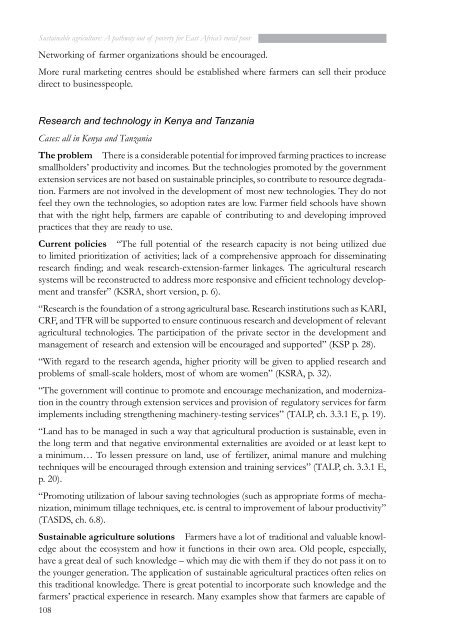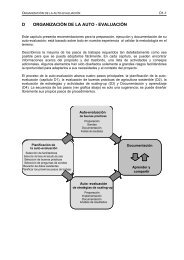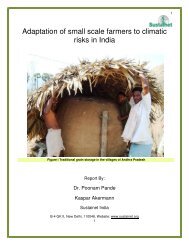cases from tanzania - Sustainet
cases from tanzania - Sustainet
cases from tanzania - Sustainet
You also want an ePaper? Increase the reach of your titles
YUMPU automatically turns print PDFs into web optimized ePapers that Google loves.
Sustainable agriculture: A pathway out of poverty for East Africa’s rural poor<br />
Networking of farmer organizations should be encouraged.<br />
More rural marketing centres should be established where farmers can sell their produce<br />
direct to businesspeople.<br />
Research and technology in Kenya and Tanzania<br />
Cases: all in Kenya and Tanzania<br />
The problem There is a considerable potential for improved farming practices to increase<br />
smallholders’ productivity and incomes. But the technologies promoted by the government<br />
extension services are not based on sustainable principles, so contribute to resource degradation.<br />
Farmers are not involved in the development of most new technologies. They do not<br />
feel they own the technologies, so adoption rates are low. Farmer field schools have shown<br />
that with the right help, farmers are capable of contributing to and developing improved<br />
practices that they are ready to use.<br />
Current policies “The full potential of the research capacity is not being utilized due<br />
to limited prioritization of activities; lack of a comprehensive approach for disseminating<br />
research finding; and weak research-extension-farmer linkages. The agricultural research<br />
systems will be reconstructed to address more responsive and efficient technology development<br />
and transfer” (KSRA, short version, p. 6).<br />
“Research is the foundation of a strong agricultural base. Research institutions such as KARI,<br />
CRF, and TFR will be supported to ensure continuous research and development of relevant<br />
agricultural technologies. The participation of the private sector in the development and<br />
management of research and extension will be encouraged and supported” (KSP p. 28).<br />
“With regard to the research agenda, higher priority will be given to applied research and<br />
problems of small-scale holders, most of whom are women” (KSRA, p. 32).<br />
“The government will continue to promote and encourage mechanization, and modernization<br />
in the country through extension services and provision of regulatory services for farm<br />
implements including strengthening machinery-testing services” (TALP, ch. 3.3.1 E, p. 19).<br />
“Land has to be managed in such a way that agricultural production is sustainable, even in<br />
the long term and that negative environmental externalities are avoided or at least kept to<br />
a minimum… To lessen pressure on land, use of fertilizer, animal manure and mulching<br />
techniques will be encouraged through extension and training services” (TALP, ch. 3.3.1 E,<br />
p. 20).<br />
“Promoting utilization of labour saving technologies (such as appropriate forms of mechanization,<br />
minimum tillage techniques, etc. is central to improvement of labour productivity”<br />
(TASDS, ch. 6.8).<br />
Sustainable agriculture solutions Farmers have a lot of traditional and valuable knowledge<br />
about the ecosystem and how it functions in their own area. Old people, especially,<br />
have a great deal of such knowledge – which may die with them if they do not pass it on to<br />
the younger generation. The application of sustainable agricultural practices often relies on<br />
this traditional knowledge. There is great potential to incorporate such knowledge and the<br />
farmers’ practical experience in research. Many examples show that farmers are capable of<br />
108




